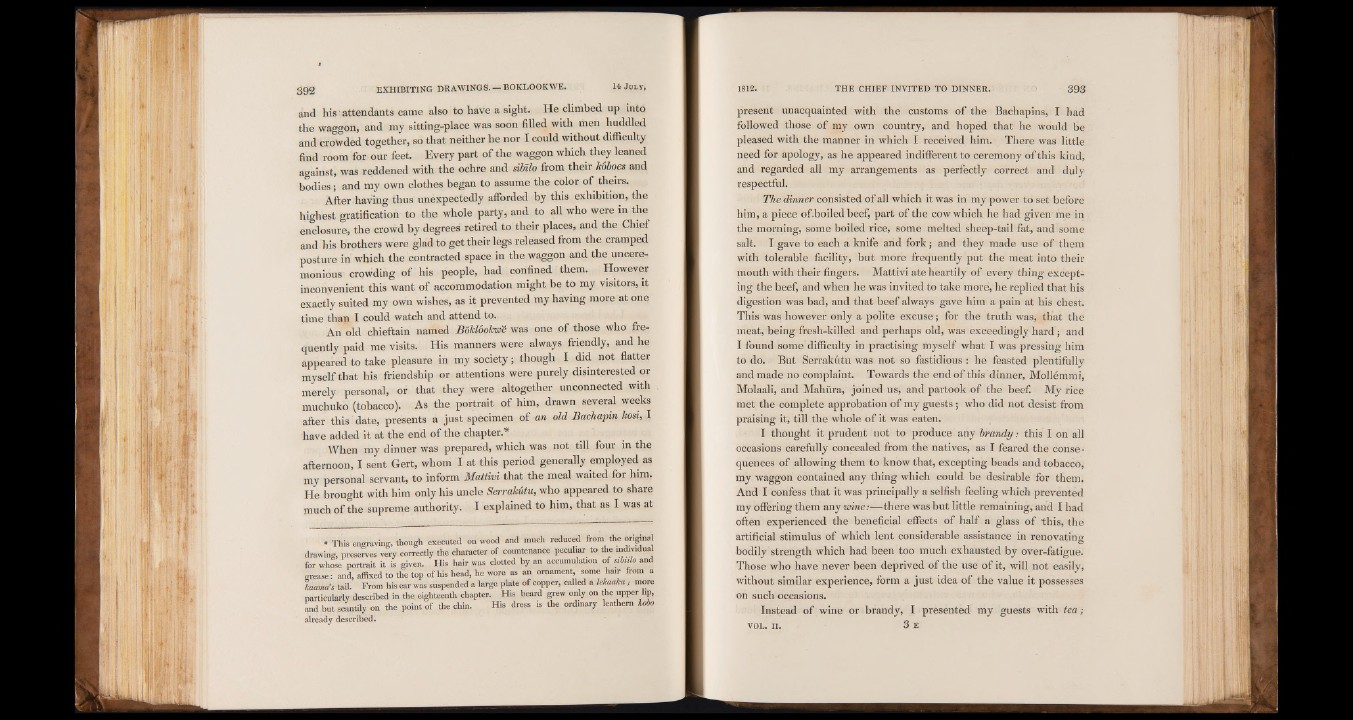
and his attendants came also to have a sight. He climbed up into
the waggon, and my sitting-place was soon filled with men huddled
and crowded together, so that neither he nor I could without difficulty
find room for our feet. Every part of the waggon which they leaned
against, was reddened with the ochre and sibilo from their hoboes and
bodies ; and my own clothes began to assume the color of theirs.
After having thus unexpectedly afforded by this exhibition, the
highest gratification to the whole party, and to all who were in the
enclosure, the crowd by degrees retired to their places, and the Chief
and his brothers were glad to get their legs released from the cramped
posture in which the contracted space in the waggon and the unceremonious
crowding of his people, had confined them. However
inconvenient this want of accommodation might be to my visitors, it
exactly suited my own wishes, as it prevented my having more at one
time than I could watch and attend to.
An old chieftain named Boklookwe was one of those who frequently
paid me visits. His manners were always friendly, and he
appeared to take pleasure in my society; though I did not flatter
myself that his friendship or attentions were purely disinterested or
merely personal, or that they were altogether unconnected with
muchuko (tobacco). As the portrait of him, drawn several weeks
after this date, presents a just specimen of an old Bachapin host, I
have added it at the end of the chapter.*
When my dinner was prepared, which was not till four in the
afternoon, I sent Gert, whom I at this period generally employed as
my personal servant, to inform Mattim that the meal waited for him.
He brought with him only his uncle Serrakutu, who appeared to share
much of the supreme authority. I explained to him, that as I was at
» This engraving, though executed on wood and much reduced from the original
drawing, preserves very correctly the character of countenance peculiar to the mdividmd
for whose portrait it is given. His hair was clotted by an accumulaUon of sitnlo and
grease: and, affixed to the top of his head, he wore as an ornament, some hair from a
kaamcts tail. From his ear was suspended a large plate of copper, called a lekaaka, more
particularly described in the eighteenth .chapter. His beard grew only on the upper lip,
and but scantily on the point of the chin. His dress is the ordinary leathern kobo
already described.
present unacquainted with the customs of the Bachapins, I had
followed those of my own country, and hoped that he would be
pleased with the manner in which I received him. There was little
need for apology, as he appeared indifferent to ceremony of this kind,
and regarded all my arrangements as perfectly correct and duly
respectful. .................
The dinner consisted of all which it was in my power to set before
him, a piece of.boiled beef, part of the cow which he had given me in
the morning, some boiled rice, some melted sheep-tail fat, and some
salt. I gave to each a knife arid fork; and they made use of them
with tolerable facility, but more frequently put the meat into their
mouth with their fingers. Mattivi ate heartily of every thing excepting
the beef, and when he was invited to take more, he replied that his
digestion was bad, and that beef always gave him a pain at his chest.
This was however only a polite excuse; for the truth was, that the
meat, being fresh-killed and perhaps old, was exceedingly hard; and
I found some difficulty in practising myself what I was pressing him
to do. But Serrakutu was not so fastidious : he feasted plentifully
and made no complaint. Towards the end of this dinner, Mollemmi,
Molaali, and Mahura, joined us, and partook of the beef. My rice
met the complete approbation of my guests; who did not desist from
praising it, till the whole of it was eaten.
I thought it prudent not to produce any brandy: this I on all
occasions carefully concealed from the natives, as I feared the consequences
of allowing them to know that, excepting beads and tobacco,
my waggon contained any thing which could be desirable for them.
And I confess that it was principally a selfish feeling which prevented
my offering them any wine:— there was but little remaining, and I had
often experienced the beneficial effects of half a glass of this, the
artificial stimulus of which lent considerable assistance in renovating
bodily strength which had been too much exhausted by over-fatigue.
Those who have never been deprived of the use of it, will not easily,
without similar experience, form a just idea of the value it possesses
on such occasions.
Instead of wine or brandy, I presented my guests with tea;
von. ii. 3 e